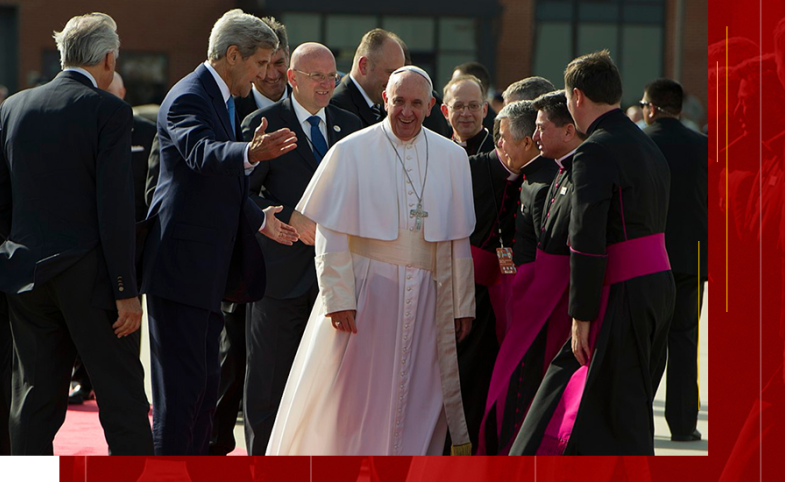“Public Diplomacy in the News” is a CPD Blog series by Andrew Dubbins that spotlights noteworthy stories on public diplomacy topics such as cultural diplomacy, nation branding, exchange programs, international...
KEEP READINGThe CPD Blog is intended to stimulate dialog among scholars and practitioners from around the world in the public diplomacy sphere. The opinions represented here are the authors' own and do not necessarily reflect CPD's views. For blogger guidelines, click here.

Public Diplomacy in the News: Pope Francis' Diplomacy, Leaked State Department Cuts, & AI in Classrooms
“Public Diplomacy in the News” is a CPD Blog series by Andrew Dubbins that spotlights noteworthy stories on public diplomacy topics such as cultural diplomacy, nation branding, exchange programs, international events and conferences, digital diplomacy, and strategic global communications.
Pope Francis’ legacy of business diplomacy. Pope Francis, who passed away last week, leaves behind a legacy of business diplomacy, marked by his engagement with global corporate leaders. Emphasizing inclusive capitalism and the moral responsibilities of business, Francis met frequently with CEOs from major tech, finance, and energy companies, encouraging ethical practices, climate responsibility, and attention to the poor. He praised innovation but warned against the dehumanizing potential of artificial intelligence and unchecked capitalism. While he built unprecedented alliances between the Vatican and business, he never wavered in his message that compassion and human dignity must guide economic pursuits.
Panic over draft order to dismantle State Department. A leaked draft executive order allegedly from President Trump proposing sweeping cuts to the State Department—including eliminating most operations in Africa and slashing offices tied to climate change, refugees, and human rights—has ignited controversy and fear among U.S. diplomats. While Secretary of State Marco Rubio dismissed the document as a “hoax,” multiple reputable outlets confirmed its circulation, and officials acknowledged growing concern within diplomatic ranks. The draft also targets key educational and cultural programs like the Fulbright scholarship. Though its authenticity remains disputed, its existence reflects the anxiety within the foreign service about potential radical restructuring.
AI integration in American classrooms. President Trump’s newly signed executive order, “Advancing Artificial Intelligence Education for American Youth,” aims to make AI literacy a national priority by directing federal agencies to integrate the technology into K-12 education. The order mandates teacher training, encourages public-private partnerships, and creates a national student competition to promote AI understanding. While experts support the focus on AI and critical thinking, they also caution that meaningful implementation may be hampered by reduced federal funding, staffing shortages, and potential political backlash. The initiative follows China’s similar educational push and reflects growing global competition in AI.
Arianna Prothero and Lauraine Langreo / Education Week
Governor Moore scores with sports diplomacy in Asia. Maryland Governor Wes Moore used sports diplomacy to strengthen international ties during his first overseas trade mission, visiting Japan and South Korea amid shifting U.S. trade policies under President Trump. By gifting a signed Orioles jersey to the governor of Kanagawa—home of Baltimore’s new Japanese pitcher Tomoyuki Sugano—Moore highlighted baseball as a shared cultural bridge. Alongside symbolic gestures, he signed an expanded agreement to deepen economic cooperation in sectors like biotechnology and life sciences. Despite rising tariffs, Moore aimed to cultivate goodwill and investment by focusing on common values and mutual opportunity.
Katie Shepherd / The Washington Post
Trump shuts down disinformation task forces. President Trump's dismantling of key national security guardrails during his second term has left the United States more vulnerable to foreign disinformation and cyber threats, according to experts and former officials. Actions such as the firing of top cybersecurity and intelligence officials, shutting down disinformation task forces, and sidelining the National Security Council have diminished institutional oversight and expertise. Pro-Russian propaganda campaigns, particularly against U.S. defense programs like the F-35, are gaining momentum in this vacuum. Critics warn that Trump's preference for obedience over expertise in national security decision-making is weakening America’s global standing and internal resilience.
Visit CPD's Online Library
Explore CPD's vast online database featuring the latest books, articles, speeches and information on international organizations dedicated to public diplomacy.
POPULAR ARTICLES
-
January 29
-
January 20
-
December 17
-
January 28
-
December 15
Join the Conversation
Interested in contributing to the CPD Blog? We welcome your posts. Read our guidelines and find out how you can submit blogs and photo essays >.













